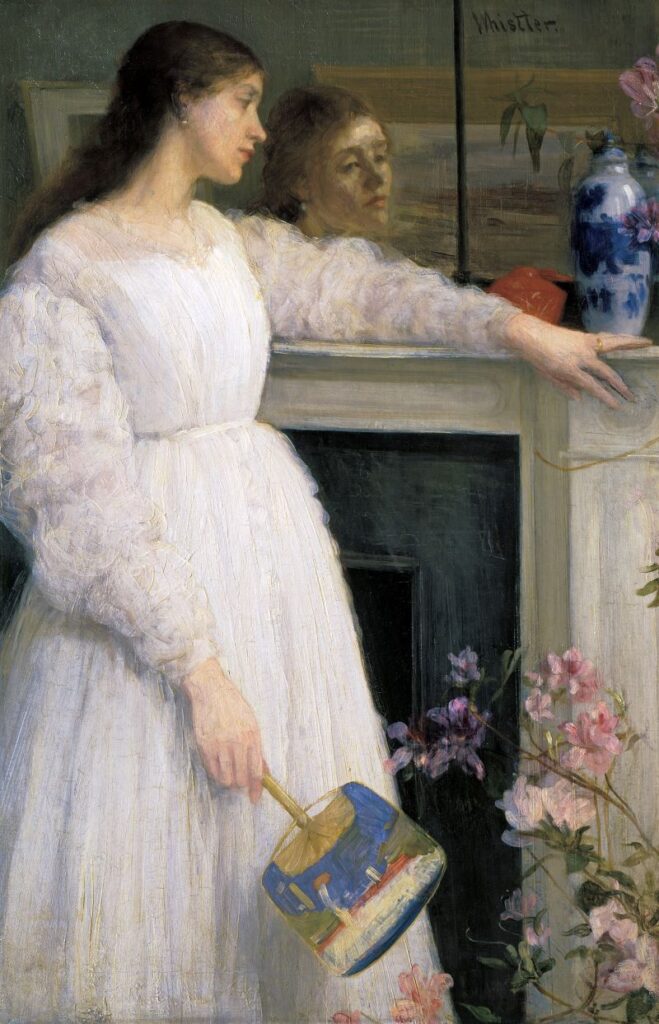In late 1863 Anna McNeill Whistler fled the war-torn United States, arriving in London early the next year and moving in with her son James. In order to accommodate her, Whistler was forced to move out his lover and live-in partner for the previous four years, Jo Hiffernan, to what he called a “buen ritiro.” Seven years later, Whistler’s great portrait would be of his mother. But in 1864, his great portrait would be of Jo. When in late 1864 Anna, for her health, moved to Torquay, Jo moved back to 7 Lindsey Row, and there modelled for a number of Whistler’s paintings. More than any of them, the one above, Symphony in White, No. 2: The Little White Girl commemorates Jo’s return to the house, depicting the mantel, the mirror, the trappings of the parlor there.
At that time, Whistler was captivated by Japonisme, and evidence of his obsession can be seen here—in the fan in Jo’s hand, the vase on the mantel, the azaleas arranged at her knees. But the eastern impulse in this painting is far more restrained in this painting than in his other works of the time populated by kimono-clad characters. Here, Jo remains Jo, their own relationship punctuated imaginatively by a curious detail: a wedding ring on her finger, something that in real live Whistler never gave her.
Algernon Charles Swinburne, seeing this portrait, was inspired to write “Before the Mirror,” a poem that in 1866 appeared in Swinburne’s breakthrough volume Poems and Ballads. Swinburne’s poem—or, at least, two-thirds of it—found its way to the public through this painting, when Whistler had its first two parts inscribed on gold leaf and then attached to the frame. That frame no longer exists. In 1888, Whistler and Swinburne had a volcanic falling-out, and four years later, when planning a great retrospective exhibition of his works, Whistler instructed his framer to replace the frame, for “the old one is quite too weak for the picture.”
Here, then, is what the painting lost, and then some: Swinburne’s “Before the Mirror,” in full.
BEFORE THE MIRROR
I
White rose in red rose-garden
Is not so white;
Snowdrops that plead for pardon
And pine for fright
Because the hard East blows
Over their maiden rows
Grow not as this face grows from pale to bright.
Behind the veil, forbidden,
Shut up from sight,
Love, is there sorrow hidden,
Is there delight?
Is joy thy dower or grief,
White rose of weary leaf,
Late rose whose life is brief, whose loves are light?
Soft snows that hard winds harden
Till each flake bite
Fill all the flowerless garden
Whose flowers took flight
Long since when summer ceased,
And men rose up from feast,
And warm west wind grew east, and warm day night.
II
“Come snow, come wind or thunder
High up in air,
I watch my face, and wonder
At my bright hair;
Nought else exalts or grieves
The rose at heart, that heaves
With love of her own leaves and lips that pair.
“She knows not loves that kissed her
She knows not where.
Art thou the ghost, my sister,
White sister there,
Am I the ghost, who knows?
My hand, a fallen rose,
Lies snow-white on white snows, and takes no care.
“I cannot see what pleasures
Or what pains were;
What pale new loves and treasures
New years will bear;
What beam will fall, what shower,
What grief or joy for dower;
But one thing-knows the flower; the flower is fair.”
III
Glad, but not flushed with gladness,
Since joys go by;
Sad, but not bent with sadness,
Since sorrows die;
Deep in the gleaming glass
She sees all past things pass,
And all sweet life that was lie down and lie.
There glowing ghosts of flowers
Draw down, draw nigh;
And wings of swift spent hours
Take flight and fly;
She sees by formless gleams,
She hears across cold streams,
Dead mouths of many dreams that sing and sigh.
Face fallen and white throat lifted,
With sleepless eye
She sees old loves that drifted,
She knew not why,
Old loves and faded fears
Float down a stream that hears
The flowing of all men’s tears beneath the sky.

